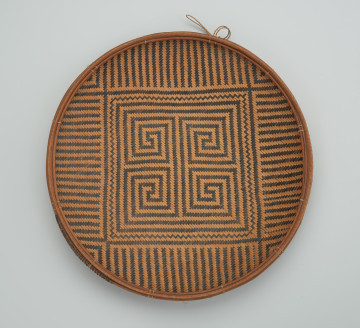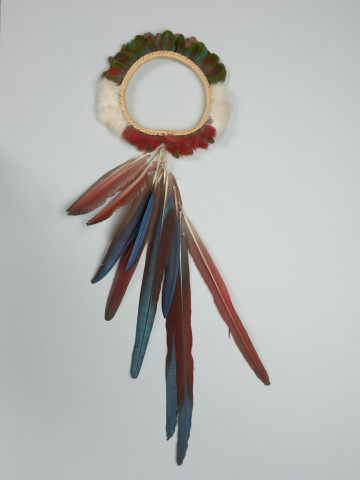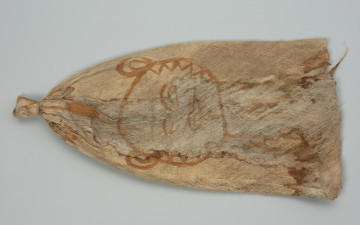
Decorated tray
około 1985
National Museum in Szczecin
Part of the collection: Crafts of the Amazon Indians
Wa'ja tomennato trays, which serve as 'tableware' for serving casave pies and are also an attribute of a shaman, are made by men, just like most plaiting products in the Ye'kuana Indian culture. They weave them from wana cane (Guasdua latifolia), whose fibres are light in colour. They obtain the effect of a two-coloured pattern by dyeing some of them with resin mixed with charcoal. The preparation of the trays requires the Indians to know the vegetation cycle of the plants, the methods of cutting wana, and obtain permission to cut from their owner - the cane spirit. Achaadi, 'ritual specialists carry out interviews with the spirit'. When the spirit gives its consent, solid and smooth stems are cut, on which the strength and beauty of the trays depend. The man embarking on the weaving must recall the myth of the origin of wa'ja tomennato and the myth associated with the pattern he wishes to reproduce. The choice of motif is not random. The young man consults his father on this matter. The tray he weaves will be a gift for his wife, and the chosen pattern will become a sign of their marriage and will be repeated on all the trays they use in the future. The central motif of this tray is the pattern of the double Iarakuru - the weeping capuchin (Cebus). She is a mythological figure who introduced night and darkness into Ye'kuan's world. Iarakuru's motif is surrounded by several layers of square frames called ishacudu and a shidiche pattern depicting stars, which in the drawing is presented in the form of small crosses woven on light and dark background. The edges of the composition are marked with straight lines with konohocudu, the motif of rain, which in Ye'kuan mythology is called 'the feet of heaven'. Mythological figures appearing on wa'ja tomennato are often associated with poisons and death. On the tray presented, Iarakuru carries poison on his back and paws. Poison, though dangerous, is an essential element in Indian life. Thanks to it, they hunt for arboreal animals and birds. Thus, it gives them food and ensures their survival. The motif of poison appearing on the tray represents the symbolic taking of control over the forces it represents.
Katarzyna Findlik-Gawron
Author / creator
Dimensions
cały obiekt: height: 6,2 cm, diameter: 33,5 cm
Object type
plate
Creation time / dating
Creation / finding place
Identification number
Location / status

około 1985
National Museum in Szczecin

około 1990 — 2000
National Museum in Szczecin

około 1960
National Museum in Szczecin
DISCOVER this TOPIC
Museum of King Jan III's Palace at Wilanów
DISCOVER this PATH
Educational path